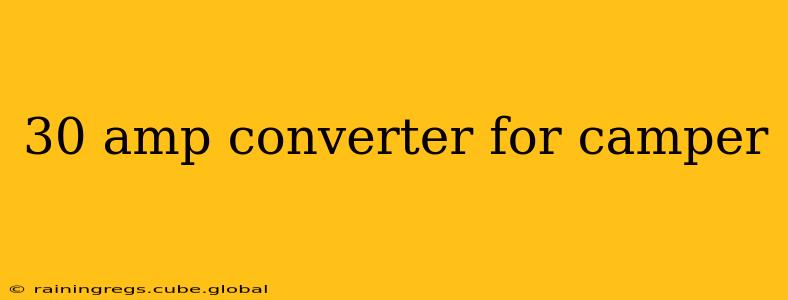Are you ready to upgrade your camping experience? Many RV parks offer 50-amp service, providing significantly more power than the standard 30-amp hookup. If your RV is equipped with a 30-amp system, a 30-amp to 50-amp converter isn't the solution you might be looking for. Instead, you need to understand the power dynamics and explore the right equipment for your needs. This comprehensive guide will explore the options for using 50-amp service with a 30-amp RV.
Understanding 30-Amp and 50-Amp RV Power
Before diving into solutions, let's clarify the difference: A 30-amp service provides a maximum of 3,600 watts (120V x 30A), while a 50-amp service delivers a whopping 12,000 watts (240V x 50A). This substantial difference is crucial for running multiple appliances simultaneously without overloading your system. Trying to force more power than your RV's system can handle through a simple converter can lead to damage to your RV's electrical system or even a fire.
What You Need: Adapters, Not Converters
A 30-amp to 50-amp "converter" doesn't exist in the way you might think. You can't convert 50 amps down to 30 amps safely and effectively. Instead, you need an adapter. This adapter plugs into the 50-amp service at the campsite and allows your 30-amp RV to connect. However, it's crucial to remember that even with an adapter, you're still limited by your RV's 30-amp capacity.
50-Amp to 30-Amp RV Adapter: How it Works
A 50-amp to 30-amp adapter simply adapts the physical connection. It takes the 50-amp plug from the campground and converts it to a 30-amp plug, allowing you to connect your RV's power cord. The adapter doesn't increase the power your RV receives; it only changes the connection type.
Important Considerations:
- Never exceed your RV's amperage rating. Using an adapter doesn't magically increase your RV's capacity. Overloading your system can cause damage or fire.
- Power management is key. Carefully monitor your power usage to avoid tripping breakers. Use power management strategies like turning off unnecessary appliances.
- Adapter quality matters. Invest in a high-quality adapter from a reputable manufacturer to ensure safety and reliability. Cheap adapters can overheat or fail.
Do I need a 50 amp service?
This is a common question. If you consistently find yourself needing to manage your power usage carefully to avoid tripping breakers, upgrading to a 50-amp RV or a power management system might be a good solution. A 50-amp service allows you to comfortably run more appliances at once.
What about a power management system?
For those who want to manage their power usage more effectively without upgrading their RV, a power management system can be incredibly helpful. These systems offer features like monitoring power consumption, prioritizing essential appliances, and preventing overload.
Can I use a 30 amp RV at a 50 amp site?
Yes, you can use a 30-amp RV at a 50-amp site using a 50-amp to 30-amp adapter. But remember – you are still limited by your RV's 30-amp capacity.
What are the risks of using a 50 amp to 30 amp adapter?
The primary risk is overloading your RV's electrical system. Beyond this, using a low-quality adapter could lead to overheating or fire. Always ensure your adapter is appropriately rated and of high quality.
By understanding the differences between 30-amp and 50-amp service and using the appropriate adapter, you can safely and effectively enjoy the benefits of higher-amperage hookups at your campsite, while avoiding the dangers of overloading your RV's electrical system. Remember, responsible power management is key to a safe and enjoyable camping experience.
